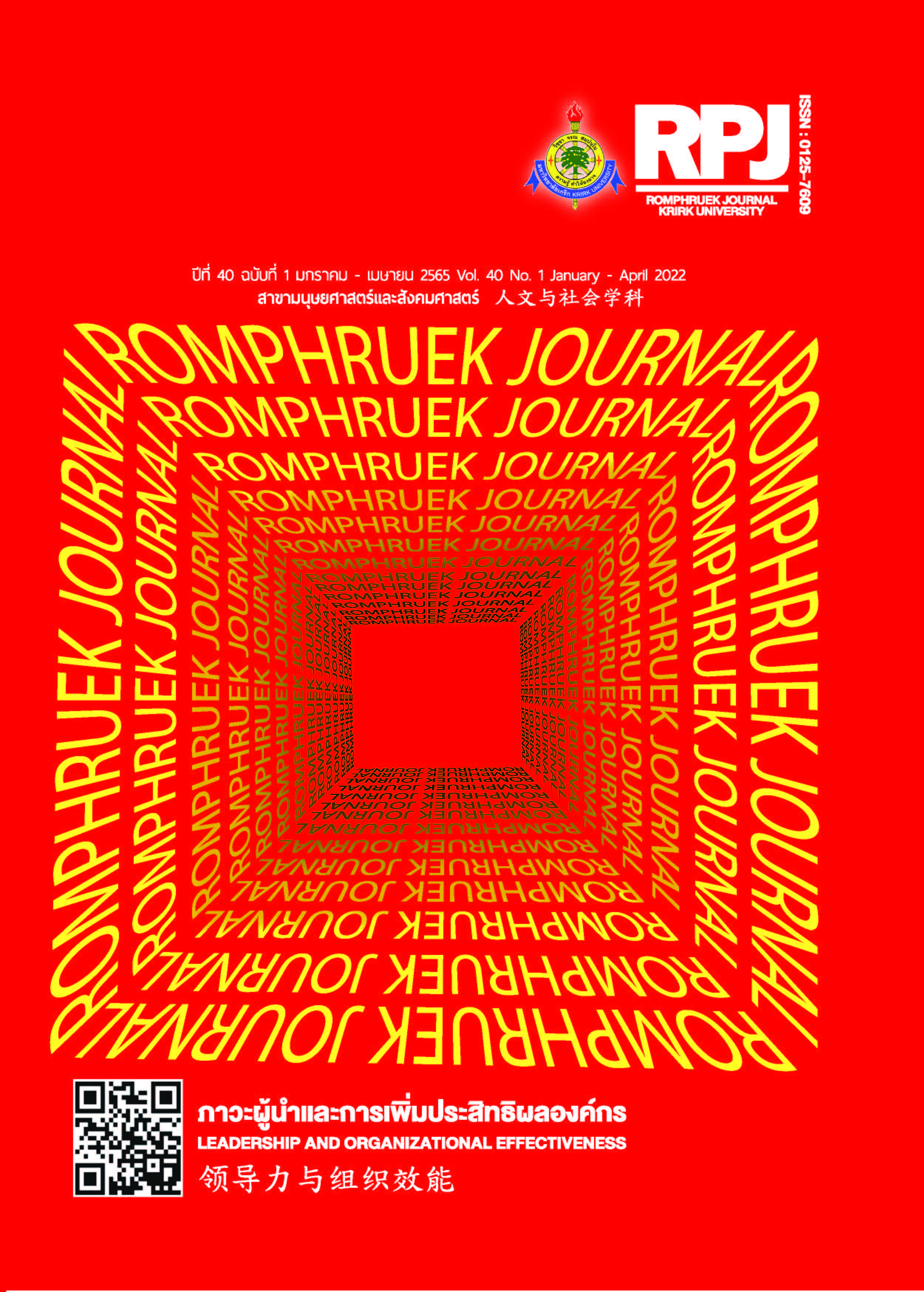The Influence of Organization Culture, Personal Competence and Knowledge Management on Safety Behaviour of Employees in an Automotive Parts Manufacturing Company in the Eastern Seaboard Industrial Estate (Rayong)
Main Article Content
Abstract
The objectives of this research is to 1) investigate the level of the organizational culture, personal competence, knowledge management affecting the safety behaviour, 2) analyze knowledge management as the mediator between the organizational culture and the safety behaviour, and 3) analyze the personal competence as the mediator between the organizational culture and the safety behaviour of employees of an automotive parts company in the Eastern Seaboard Industrial Estate, Rayong Province. The samples used in the research were 180 employees of an auto parts manufacturing company in the Eastern Seaboard Industrial Estate, Rayong Province. The statistics used were frequency, percentage, mean and standard deviation. The structural equation model (SEM) was analyzed by using the Smart PLS 3.0 program.
The results found that 1) the majority of the respondents possessed the overall level of the organizational culture, personal competence, knowledge management and safety behaviour at a high level with the mean of 4.25, 4.39, 4.16 and 4.50, respectively, and the standard deviations of 0.863, 0.709, 0.833 and 0.714, respectively, 2) the knowledge management as the mediator affected between the organizational culture and the safety behaviour , and 3) the personal competence as the mediator affected between the organizational culture and the safety behaviour at work. In conclusion, these three attributes contributed to the safety behaviour. Once an organization had created the knowledge management and the personal competence were continuously developed, the organization could gain sustainable competitive advantage, and increase continuously the awareness of safety at work as well.
Article Details

This work is licensed under a Creative Commons Attribution-NonCommercial-NoDerivatives 4.0 International License.
Every article published in the Romphruek Journal of the Humanities and Social Sciences is the opinion and point of view of the authors. Thery're not the viewpoint of Krirk University or the editored department. Any part or all of the articles for pablication must be clearly cited.
References
กมลพร ศรีใส. (2562). การจัดการความรู้เพื่อเพิ่มประสิทธิภาพการทำงานของพนักงานบริษัทประกันภัย. หลักสูตรบริหารธุรกิจมหาบัณฑิต สาขาวิชาบริหารธุรกิจ มหาวิทยาลัยเอเชียอาคเนย์, กรุงเทพฯ.
กรมสวัสดิการและคุ้มครองแรงงาน. (2564). ความปลอดภัยในการทำงานของผู้ปฏิบัติงานภายในอุตสาหกรรม. (1 มิถุนายน 2564) สืบค้นจาก http://osh.labour.go.th/.
กัลยารัตน์ ธีระธนชัยกุล. (2557). การจัดการความรู้ ปัจจัยสู่ความสำเร็จ. วารสารปัญญาภิวัฒน์, 5(ฉบับพิเศษ), 137-144.
นิมิตร โสชารี. (2559). รูปแบบการพัฒนาองค์กรแห่งการเรียนรู้ของเทษบาลตำบาลในเขตภาคตะวันออกเฉียงเหนือ. หลักสูตรรัฐประศาสนศาสตรดุษฎีบัณฑิต มหาวิทยาลัยราชภัฎมหาสารคาม, มหาสารคาม.
บุญช่วย ศิริเกษ. (2557). การศึกษาวัฒนธรรมองค์การแบบสร้างสรรค์กับการเป็นองค์กรแห่งการเรียนรู้ในมหาวิทยาลัยมหามกุฏราชวิทยาลัย วิทยาเขตล้านช้าง. หลักสูตรศึกษาศาสตรมหาบัณฑิต มหาวิทยาลัยมหามกุฏราชวิทยาลัย, เลย.
ปาณิสรา จรัสวิญญู. (2561). ความสัมพันธ์เชิงสาเหตุของวัฒนธรรมองค์กรและการจัดการความรู้ที่ส่งผลต่อผลการดำเนินงานของธุรกิจอุตสาหกรรมในจังหวัดกำแพงเพชร. วารสารวิทยาการจัดการสมัยใหม่, 11(1), 154-170.
มนตรี พิริยะกุล. (2553). ตัวแบบเส้นทางกำลังสองน้อยที่บางส่วน. กรุงเทพฯ : มหาวิทยาลัยรามคำแหง.
ยาใจ ธรรมพิทักษ์. (2559). ปัจจัยที่ส่งผลต่อการพัฒนาสมรรถนะของพนักงานโรงแรม ในประชาคมเศรษฐกิจอาเซียน. หลักสูตรบริหารธุรกิจมหาบัณฑิต มหาวิทยาลัยเทคโนโลยีราชมงคลธัญบุรี, ปทุมธานี.
ศตวรรษ กล่ำดิษฐ์. (2560). สมรรถนะที่ส่งผลต่อการปฏิบัติงานของพนักงานฝ่ายผลิตในอุตสาหกรรมการผลิตสายไฟฟ้า กรณีศึกษาบริษัท สายไฟฟ้าไทย-ยาซากิ จำกัด. หลักสูตรบริหารธุรกิจมหาบัณฑิต มหาวิทยาลัยเทคโนโลยีราชมงคลกรุงเทพ, กรุงเทพฯ.
สิริศา จักรบุญมา. (2557). ปัจจัยที่มีอิทธิพลต่อพฤติกรรมการทำงานของพนักงานฝายบำรุงรักษาในรัฐวิสาหกิจแห่งหนึ่ง. หลักสูตรวิทยาศาสตรมาหบัณฑิต มหาวิทยาลัยเกษตรศาสตร์, กรุงเทพฯ.
Best, J. W. (1977). Research in Education. (3rd ed). New Jersey : Prentice-hall Inc.
Hair Jr, J. F., Sarstedt, M., Ringle, C. M., & Gudergan, S. P. (2018). Advanced issues in partial least squares structural equation modeling. Loss Angeles : Sage
Jerie, S., & Baldwin, J. (2017). The effectiveness of behaviour-based safety (BBS) in accident prevention at a pine timber processing plant in Nyanga District, Zimbabwe. Review of Social Sciences, 2(6), 01-10.
Kunskaja, S. (2018). Expert evaluation of the expression of personal competencies in professional activities. European Journal of Economics and Business Studies, 4(2), 197-205.
Likert, R. (1932). A technique for the measurement of attitudes. Archives of psychology, 22(140), 1-55.
Wilson, N. Y., & Alfadhli, M. I. (2020). The Influence of Knowledge Management on Application of Audit Standards : Evidence from Al-Ahlia Cement Company, Libya. International Journal of Academic Research in Business and Social Sciences, 10(12), 897–906.
Yusof, H. S. M., Munap, R., Badrillah, M. I. M., Hamid, N. R. A., & Khir, R. M. (2017). The relationship between organizational culture and employee motivation as moderated by work attitude. Journal of Administrative and Business Studies, 3(1), 21-25.


